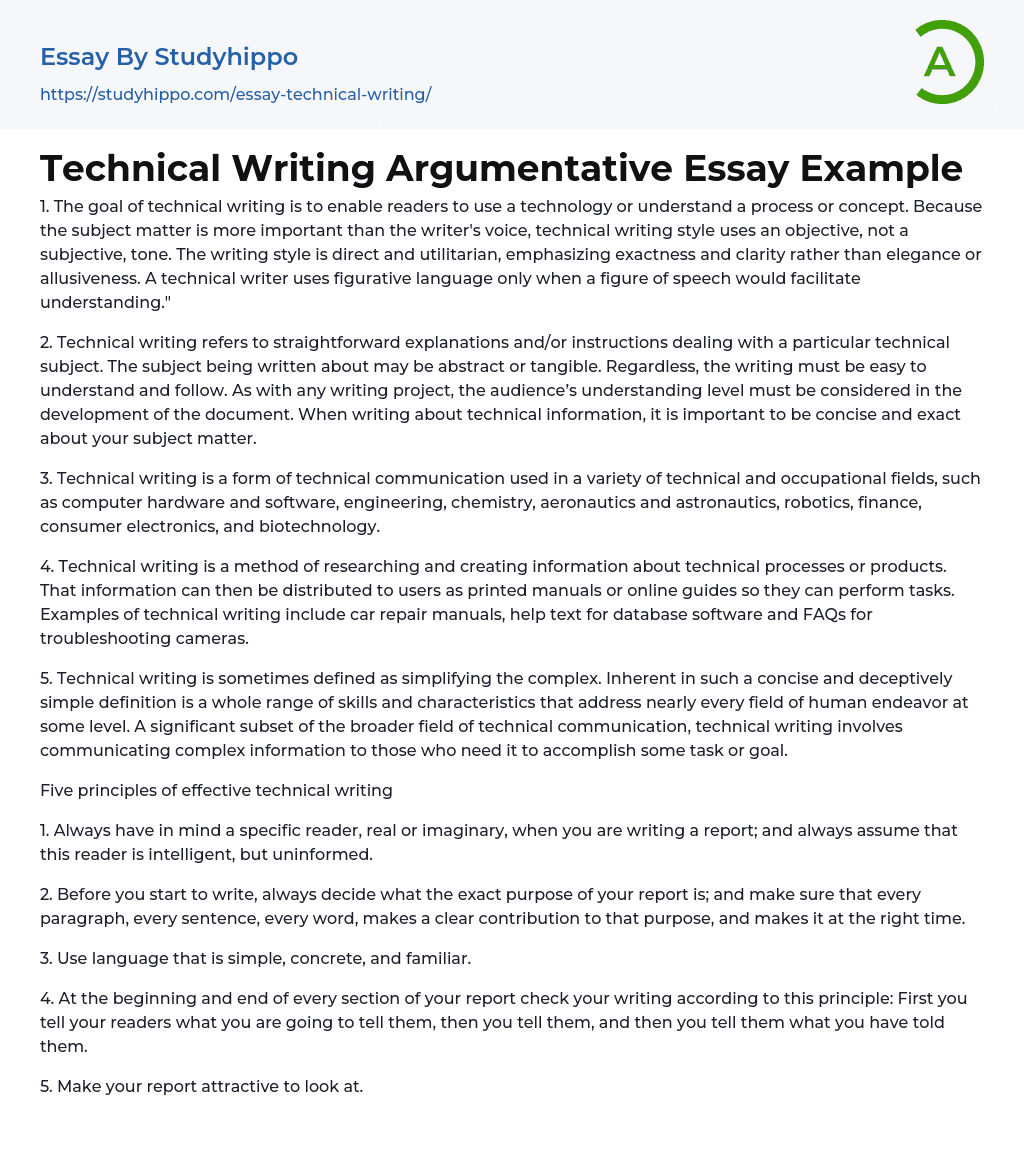1. The goal of technical writing is to enable readers to use a technology or understand a process or concept. Because the subject matter is more important than the writer's voice, technical writing style uses an objective, not a subjective, tone. The writing style is direct and utilitarian, emphasizing exactness and clarity rather than elegance or allusiveness. A technical writer uses figurative language only when a figure of speech would facilitate understanding."
2. Technical writing refers to straightforward explanations and/or instructions dealing with a particular technical subject. The subject being written about may be abstract or tangible. Regardless, the writing must be easy to understand and follow. As with any writing project, the audience’s understanding level must be considered in the development of the document. When writing about technical information, it is important to be concise and exact about
...your subject matter.
3. Technical writing is a form of technical communication used in a variety of technical and occupational fields, such as computer hardware and software, engineering, chemistry, aeronautics and astronautics, robotics, finance, consumer electronics, and biotechnology.
4. Technical writing is a method of researching and creating information about technical processes or products. That information can then be distributed to users as printed manuals or online guides so they can perform tasks. Examples of technical writing include car repair manuals, help text for database software and FAQs for troubleshooting cameras.
5. Technical writing is sometimes defined as simplifying the complex. Inherent in such a concise and deceptively simple definition is a whole range of skills and characteristics that address nearly every field of human endeavor at some level.
significant subset of the broader field of technical communication, technical writing involves communicating complex information to those who need it to accomplish some task or goal.
Five principles of effective technical writing
1. Always have in mind a specific reader, real or imaginary, when you are writing a report; and always assume that this reader is intelligent, but uninformed.
2. Before you start to write, always decide what the exact purpose of your report is; and make sure that every paragraph, every sentence, every word, makes a clear contribution to that purpose, and makes it at the right time.
3. Use language that is simple, concrete, and familiar.
4. At the beginning and end of every section of your report check your writing according to this principle: First you tell your readers what you are going to tell them, then you tell them, and then you tell them what you have told them.
5. Make your report attractive to look at.
- John Locke essays
- 9/11 essays
- A Good Teacher essays
- A Healthy Diet essays
- A Modest Proposal essays
- A&P essays
- Academic Achievement essays
- Achievement essays
- Achieving goals essays
- Admission essays
- Advantages And Disadvantages Of Internet essays
- Alcoholic drinks essays
- Ammonia essays
- Analytical essays
- Ancient Olympic Games essays
- APA essays
- Arabian Peninsula essays
- Argument essays
- Argumentative essays
- Art essays
- Atlantic Ocean essays
- Auto-ethnography essays
- Autobiography essays
- Ballad essays
- Batman essays
- Binge Eating essays
- Black Power Movement essays
- Blogger essays
- Body Mass Index essays
- Book I Want a Wife essays
- Boycott essays
- Breastfeeding essays
- Bulimia Nervosa essays
- Business essays
- Business Process essays
- Canterbury essays
- Carbonate essays
- Catalina de Erauso essays
- Cause and Effect essays
- Cesar Chavez essays
- Character Analysis essays
- Chemical Compound essays
- Chemical Element essays
- Chemical Substance essays
- Cherokee essays
- Cherry essays
- Childhood Obesity essays
- Chlorine essays
- Classification essays
- Cognitive Science essays




